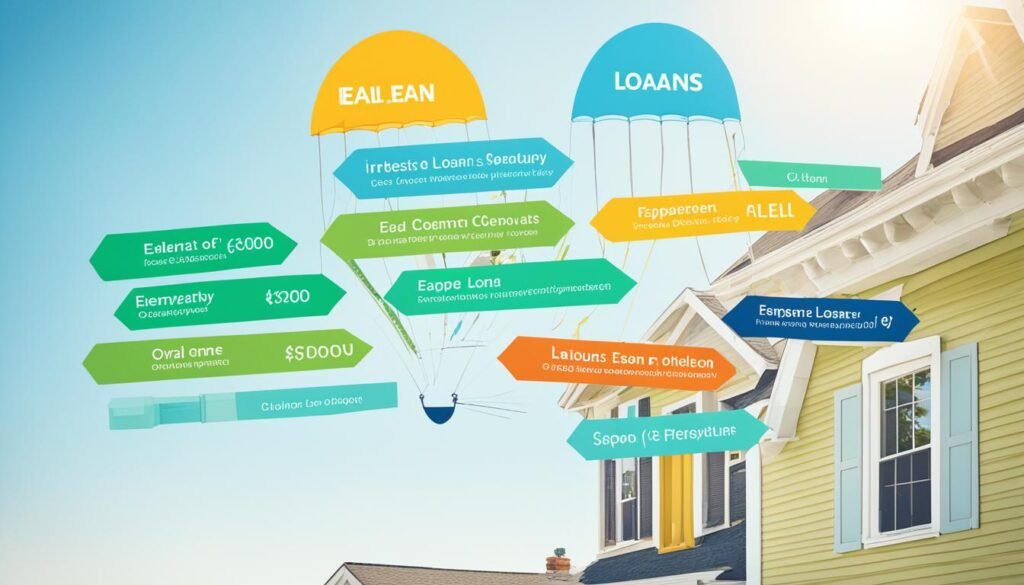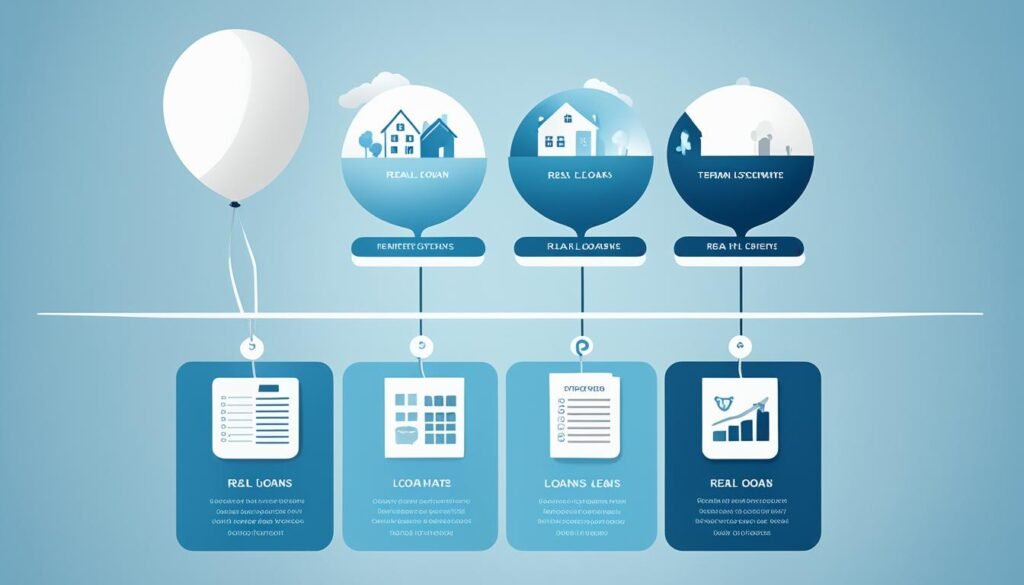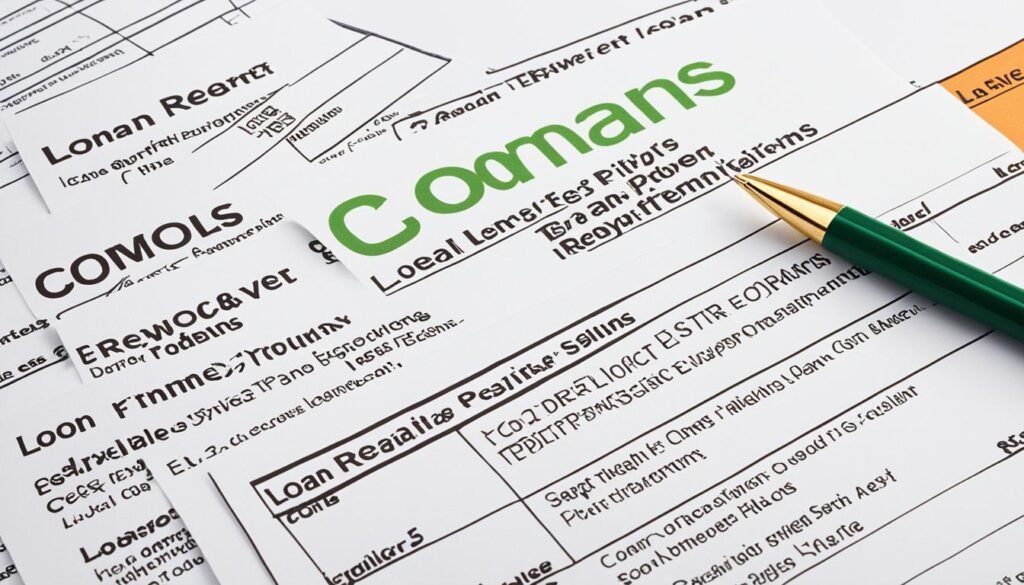Table of Contents
ToggleDealing with real estate loans might seem scary at first. But knowing about repayment terms and choices available can make it easier. This knowledge is key for both new home buyers and seasoned investors.
Loan options include traditional loans, government-backed ones (like FHA, VA, USDA), and special programs. The type of loan you pick affects things like the down payment and total loan cost. It also influences how much you can borrow and the prices you can look at.
Mortgages generally come as 30-year or 15-year plans. The length of your mortgage affects your monthly payments and the total interest you pay. You might also find adjustable-rate mortgages or other special loan terms.
It’s vital for homebuyers and investors to understand real estate financing options. This way, they can get the best rates and terms for their needs. By exploring choices and working with mortgage experts, finding the perfect mortgage becomes achievable.
Key Takeaways
- Real estate loans come in three main types: conventional, government (FHA, VA, USDA), and special programs.
- Your loan choice impacts things like down payment, total cost, and the property prices you can consider.
- The 30-year and 15-year loans each have different payments, rates, and total interest paid.
- There are also adjustable-rate loans and other special options to think about.
- Understanding repayment and loan options is essential for getting the right mortgage.
Understanding Real Estate Financing
Real estate financing means finding ways and sources to buy homes or commercial buildings. One common way is through a loan. This loan is paid back using the money the property makes.
Definition and Purpose
Real estate financing is all about how people and companies get money to buy, develop, or invest in properties. Its main goal is to give the funds needed for real estate projects.
Common Scenarios for Real Estate Financing
This financing is needed for buying homes, commercial buildings, and even land. It’s used for flipping properties or buying places to rent out. For this, funds can be used for down payments, building costs, or to improve old properties.
Benefits of Real Estate Investment
Putting money in real estate can lead to making money in several ways. You can earn through rent or by selling at a higher price later. It can be good for taxes, and helps diversify your investment portfolio too.
Loan Types

Mortgage loans come in three main types. There are conventional loans, government loans (FHA, VA, USDA), and special programs. Which one you pick affects your down payment, loan cost, and more. It also changes the home prices you can look at.
Conventional Loans
Conventional loans are not from the government. They need a down payment of about 20% on average. But, some allow smaller down payments. With these loans, you need a good credit score and you’ll be checked more strictly. The Federal Housing Finance Agency (FHFA) sets how much you can borrow with a conventional loan.
Government Loans (FHA, VA, USDA)
Government loans have a lighter touch on down payment and credit scores. They come from places like the FHA, VA, and USDA. Their aim is to help certain groups, like first-time buyers and veterans, get homes. Each program has its own rules and loan limits.
Special Programs
Besides the usual loans, special programs exist. They can help with down payments, lower mortgage insurance costs, and offer unique loans for special needs. Each program has its own rules and limits. Research is key to see if you qualify.
Loan Terms

The term of a mortgage loan is how long you have to pay it back. You might see loans for 30 years or 15 years most often. But, there are also loans for 10, 20, or 40 years. Each suit different financial needs and goals.
30-Year Term
A 30-year mortgage loan is popular among many homebuyers. It means paying less each month than a 15-year option. But, the interest rate is often higher. This means you’ll pay more in total interest over the loan’s life. The 30-year loan allows for smaller monthly bills.
15-Year Term
The 15-year loan is shorter and helps you pay off your home loan faster. You’ll pay more every month compared to a 30-year loan. But, the interest rate is usually lower. This means paying way less interest in total. It’s good if you want to own your home sooner and build up equity quickly.
Other Term Options
Besides 30-year and 15-year loan terms, lenders might have other options. You might find loans for 10, 20, or 40 years too. These options can match specific financial needs, like keeping payments low or paying off the loan quickly. It’s important to look at how each term affects the interest and monthly payments to find what’s best for you.
| Loan Term | Monthly Payment | Interest Rate | Total Interest Paid |
|---|---|---|---|
| 30-Year | $1,200 | 4.5% | $231,680 |
| 15-Year | $1,800 | 3.8% | $113,760 |
Interest Rate Types
In real estate, you can choose between fixed-rate mortgages and adjustable-rate mortgages (ARMs). Your decision can really affect how much you pay each month and over the years.
Fixed-Rate Mortgages
A fixed-rate mortgage keeps your interest rate the same for 15 or 30 years. This makes your monthly payments steady. It’s a good choice if you like to plan without worrying about interest rate changes.
Adjustable-Rate Mortgages (ARMs)
Adjustable-rate mortgages (ARMs) start with a fixed rate that can change later. After the initial short-term period, your rate might go up or down. But, there are limits on how much it can change. ARMs work well if you think you’ll make more money later or plan to move in a few years.
| Fixed-Rate Mortgage | Adjustable-Rate Mortgage (ARM) |
|---|---|
| Interest rate remains the same throughout the loan term | Interest rate can fluctuate over the life of the loan |
| Predictable monthly payments | Monthly payments can change with interest rate adjustments |
| Preferred by homebuyers who value stability | Appealing to borrowers who expect income growth or short-term occupancy |
| Suitable for long-term homeownership | Suitable for short-term or transitional homeownership |
Real Estate Loans
Real estate financing, like mortgage loans, is tightly regulated to safeguard both parties. Lenders must check the borrower’s income, job situation, assets, debts, and credit history. This is to make sure the borrower can pay back the loan, known as the ability-to-repay.
It’s important to know about qualified mortgage (QM) and non-qualified mortgage (non-QM) loans. QM loans follow guidelines outlined by the Consumer Financial Protection Bureau (CFPB). They meet specific standards to reduce risk. On the other hand, non-QM loans might have features that make them riskier. This could lead to higher costs or difficulties in repayment.
Lenders carefully consider a borrower’s financial details. They then decide if the borrower can manage to pay back the loan, whether it’s QM or non-QM. This check helps reduce the risk of giving out real estate loans. It adds a layer of security for both the borrower and the lender.
| Loan Type | Key Features | Regulations | Borrower Qualifications |
|---|---|---|---|
| Qualified Mortgage (QM) | – Predictable, stable loan features – Verified borrower income, assets, and debts – Limits on certain risky loan characteristics |
– Meets CFPB’s Ability-to-Repay (ATR) standards – Lender must follow proper underwriting procedures |
– Stable income and employment history – Manageable debt-to-income ratio – Sufficient assets and creditworthiness |
| Non-Qualified Mortgage (Non-QM) | – May have higher-risk features – Less stringent underwriting requirements – Potentially higher interest rates and fees |
– Does not meet all CFPB’s QM standards – Lender must still assess ability-to-repay |
– May accommodate non-traditional income sources – Flexible credit profiles and debt-to-income ratios |
Knowing the rules and requirements for real estate loans is vital for borrowers. It helps them understand the mortgage financing process well. This way, they can find the best loan for their situation.
Loan Regulations and Qualifications

Mortgage loans follow rules laid out by governments to ensure borrowers can repay. If lenders check finances thoroughly and the loan fits certain standards, it’s called a “qualified mortgage.”
Qualified Mortgages
Qualified mortgages meet specific guidelines by the Consumer Financial Protection Bureau (CFPB). This is to keep borrowers safe from risky loan features. Lenders carefully confirm the borrower’s financial info to see if they are able to repay the loan.
Non-Qualified Mortgages
On the other hand, non-qualified mortgages don’t meet all the strict standards. They might have features that make them riskier, like interest-only payments. Lenders check the borrower’s finances for these loans too, but they have more leeway in their decision-making.
Avoiding Pitfalls in Real Estate Financing
When looking at real estate financing choices, it’s smart to avoid certain risky loan features. These can surprise you later, or make your loan costs go up. Some risky loan features are:
Risky Loan Features
- Balloon payments – These involve a big, final payment at the end of the loan.
- Negative amortization – Your monthly payment might not cover the interest, so the loan balance grows.
- Interest-only loans – With these, you only pay the interest, not the principal amount.
Prepayment Penalties
Be wary of prepayment penalties. They’re fees you face if you pay off the loan early. These penalties can hinder your plans to refinance or sell your property early, adding extra challenges and costs. Knowing about and avoiding risky loan features, and understanding all the details and loan costs is key. It helps you steer clear of real estate financing pitfalls.
Traditional Mortgage Loans

Currently, interest rates are at historic lows, making traditional mortgage financing a top choice. These loans, offered by banks and mortgage lenders, are known as real estate financing. They require a larger down payment and stricter credit score limits than government-backed loans. But, they usually come with better interest rates for those who qualify.
Many homebuyers find mortgage loans a great way to reach their homeownership goals. Lenders look at things like your credit history, debt-to-income ratio, and asset position. These help determine the loan amount, interest rate, and other terms. This makes it possible to get financing that fits your budget and plans.
For anyone looking to buy a home, knowing about traditional mortgage loans is very important. First, research and compare what different mortgage lenders offer. This helps you choose a conventional loan that matches exactly what you need and want.
Alternative Financing Options
Instead of the usual bank loans, real estate investors and homebuyers might look into other ways to finance their ventures. These options might be more flexible or offer quicker access to funds that traditional routes do not.
Also Read: Get Your Dream Home With A Home Renovation Loan
Home Equity Loans (HELOCs)
A HELOC, or home equity loan, lets homeowners use their property’s equity to borrow money. It’s great for things like fixing up your home, paying off debts, or other big costs. With a HELOC, you get an open line of credit with changing interest rates.
Portfolio Loans
Portfolio loans are not like regular mortgage loans. A lender keeps these in their own investment pool, not selling them to big government-backed groups. They’re useful for people who don’t fit the usual loan mold, like those with diverse income streams or many investment properties.
Lease to Buy
Lease-to-own options let hopeful homebuyers move in right away and work up to owning the place, without needing a big bank loan first. This way can help those buying their first home or with less-than-perfect credit, making owning a home possible through smaller steps.
Cash Financing
Buying property with cash means you don’t have to deal with banks or mortgage payments. It’s a strategy for investors or those who have a lot of ready money. This approach cuts out interest and lets you own the property outright from the start.
FAQs
Q: What are the different types of mortgage loans available for real estate financing?
A: Some common types of mortgage loans include FHA loans, VA loans, jumbo loans, conventional mortgages, and fixed-rate mortgages.
Q: How can I determine the best mortgage for my needs?
A: To find the best mortgage, consider factors such as the type of mortgage, interest rate, monthly mortgage payment, closing costs, and loan program options.
Q: How can I estimate my monthly mortgage payment?
A: You can use a mortgage calculator to estimate your monthly mortgage payment based on factors such as the loan amount, interest rate, and term of the loan.
Q: What is private mortgage insurance (PMI) and when is it required?
A: Private mortgage insurance is a type of insurance that may be required for borrowers who have a down payment of less than 20% when purchasing a home.
Q: How do I compare mortgage lenders to find the right one for me?
A: To compare mortgage lenders, consider factors such as current mortgage rates, loan programs offered, customer reviews, and the overall cost of the loan.
Q: What is the mortgage application process like?
A: The mortgage application process involves submitting financial documents, completing an application form, getting pre-approved, and providing information about the subject property.
Q: How can I find the best mortgage rates available in the market?
A: To find the best mortgage rates, you can shop around with different lenders, compare offers, negotiate with lenders, and consider factors such as your credit score and the type of loan you are looking for.




